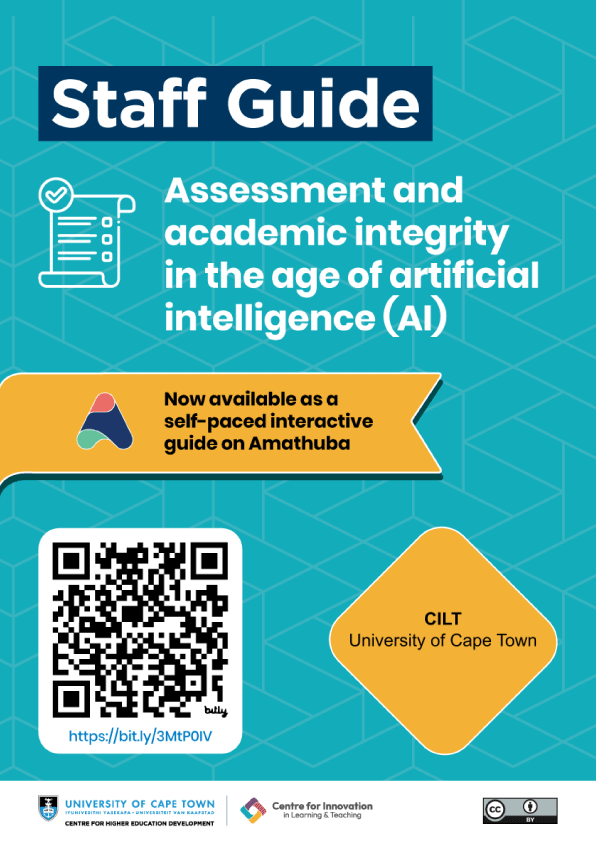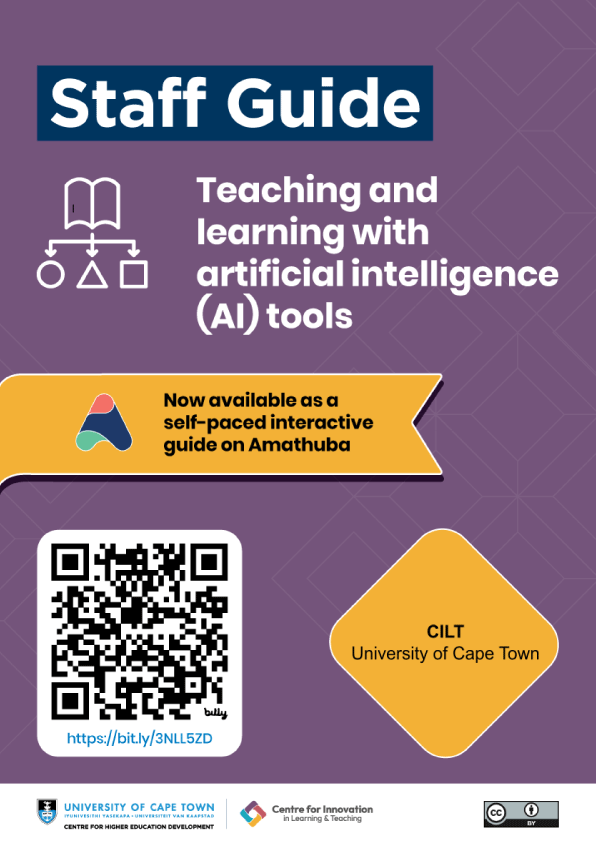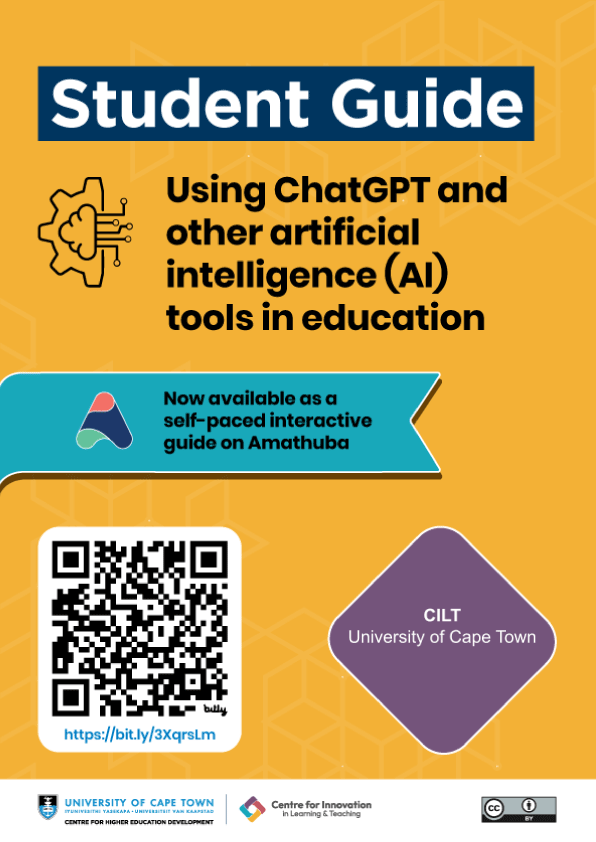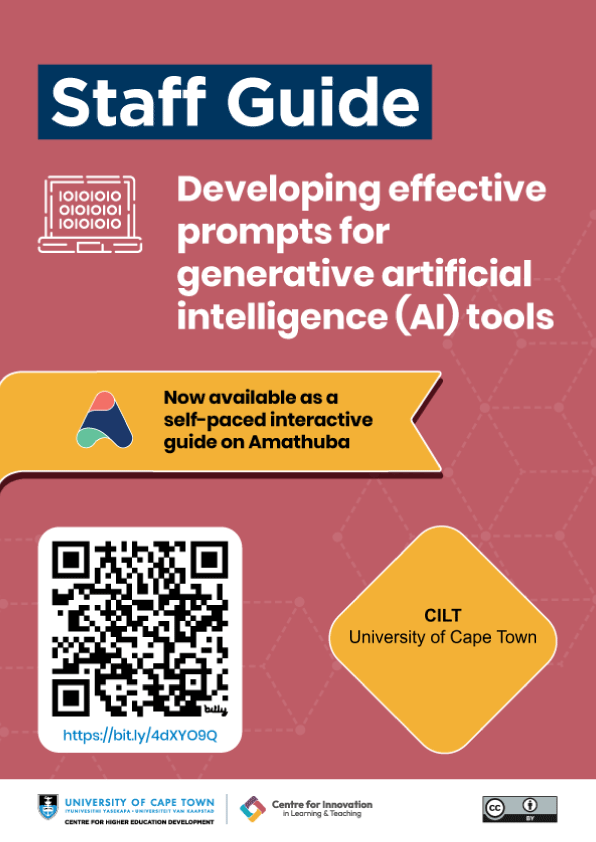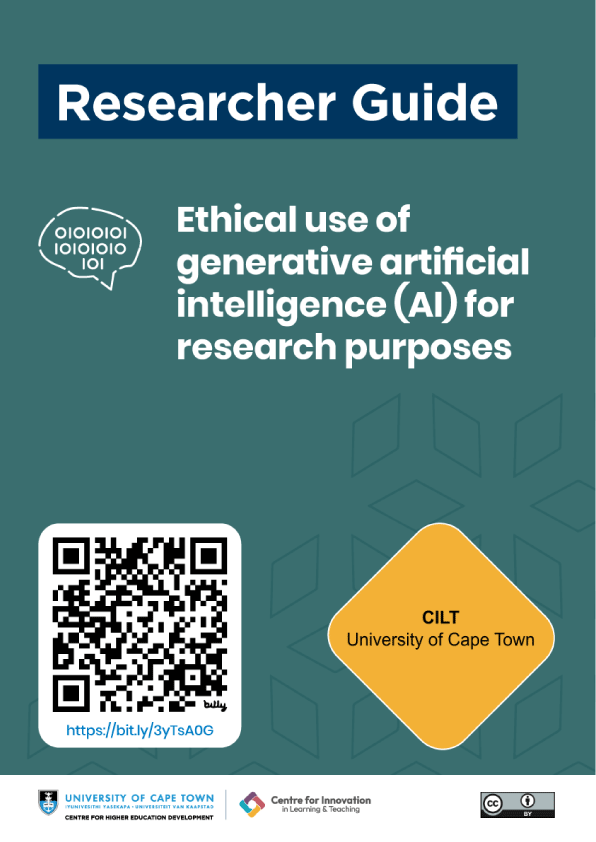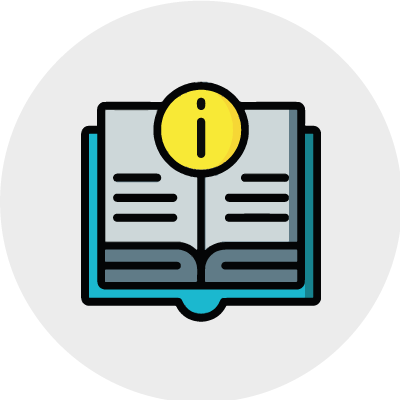Generative Artificial Intelligence (GenAI) is transforming higher education, bringing new opportunities and challenges for teaching and learning. To support UCT staff and students to navigate GenAI in education, we have developed comprehensive guides accessible to anyone interested in understanding and engaging with GenAI responsibly. These guides explore key concepts, ethical considerations, and best practices for using AI in education. These guides are freely available to anyone interested in understanding GenAI’s role in academia.
For those who prefer a more interactive learning experience, an Interactive GenAI Guide is also available on Amathuba for UCT staff and students. This self-paced resource is designed for you, providing structured activities and practical applications, to engage more deeply with GenAI in education.
Staff Guide: Assessment and academic integrity in the age of artificial intelligence (AI)
Bitly Link: https://bit.ly/3MtP0IV
This practical guide supports academic staff in navigating assessment design and academic integrity in the context of GenAI. It offers clear strategies, approaches, and tools to help you adapt your assessment practices and uphold integrity in an evolving digital landscape.
Staff Guide: Teaching and learning with artificial intelligence (AI) tools
Bitly Link: https://bit.ly/3NLL5ZD
This guide introduces academic staff to the possibilities and pitfalls of generative AI tools like ChatGPT in teaching and learning. Explore practical applications, consider ethical implications, and access curated resources to support informed, context-sensitive use in your classroom.
Student Guide: Using ChatGPT and other artificial intelligence (AI) tools in education
Bitly Link: https://bit.ly/3XqrsLm
This guide helps you, our students, understand how to use GenAI tools like ChatGPT responsibly and effectively in your learning. Explore useful applications, understand ethical considerations, and find resources to support your academic success in an AI-enhanced world.
Staff Guide: Developing effective prompts for generative artificial intelligence (AI) tools
Bitly Link: https://bit.ly/4dXYO9Q
Prompting involves crafting effective strategies to engage with GenAI tools. Clearer instructions result in more accurate outputs. Ambiguous prompts are more likely to produce inaccurate outputs. This guide summarises productive prompting strategies and common practices.
Researcher's Guide: Ethical use of generative artificial intelligence (AI) for research purposes
Bitly Link: https://bit.ly/3yTsA0G
As GenAI tools become more accessible, they raise important questions about research integrity, ethics, and practice. This guide explores how researchers are using GenAI, outlines potential risks and benefits, and offers guidance for integrating these tools responsibly into the research process.
Interactive Guides (Available on Amathuba for UCT Staff & Students)
In addition to the open-access guide, UCT staff and students can engage with AI concepts more interactively through the self-paced Interactive AI Guide on Amathuba. This resource is designed to help staff and students explore AI in education through structured activities and practical applications.
➡ [Access the Interactive AI Guides on Amathuba] (UCT login required)
CILT AI webinars, workshops, courses and events
For current webinars, workshops and events, please visit the CILT Webinars and Training page.
For recordings of past events hosted by CILT: See the CILT YouTube Channel
For podcasts on AI: Scan through the Learning Exchange
For greater depth, consider joining the UCT short course Designing with AI
Need help or want to share your experience?
Have you incorporated generative AI into your teaching or want to discuss a particular issue or challenge? We value your input and invite you to contribute to the growing collection of examples highlighting successful use cases and challenges encountered. To share your experiences, you can reach out to us via email at cilt-helpdesk@uct.ac.za to discuss applications, seek assistance, or connect with a dedicated CILT staff member.
AI resources from other institutions
CHERTL: Rhodes University, 2023 Getting started with Generative AI Tools
National Centre for AI, JISC: (2023) A Generative AI Primer.
UNESCO 2023, ChatGPT and Artificial Intelligence in higher education: Quick Start Guide
MetaLab (at) Harvard, 2025 AI Guide – The AI Pedagogy Project

